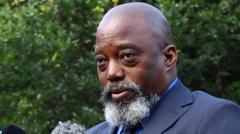Former Congolese President Joseph Kabila has returned to the DR Congo after two years in self-imposed exile amidst ongoing tensions with the current government and the M23 rebel group.
Kabila Returns: Ex-DR Congo President Stepping Back into Controversy

Kabila Returns: Ex-DR Congo President Stepping Back into Controversy
Joseph Kabila's return coincides with accusations of his involvement with rebels in the region.
Former Democratic Republic of Congo President Joseph Kabila has made a notable return to the country after two years of self-imposed exile, landing in the eastern city of Goma, which has been under rebel control. This arrival is particularly significant as it follows recent actions taken by the Congolese Senate, which has removed Kabila's immunity over allegations he supported the Rwanda-backed M23 rebel group involved in conflict against the Congolese army.
At 53, Kabila took the reins of DR Congo in 2001 following the assassination of his father, Laurent Kabila, and ruled until 2019 when he handed power to President Félix Tshisekedi. Their relationship has soured since. Innocent Mirimo, a youth leader in Kabila's People's Party for Reconstruction and Democracy (PPRD), expressed relief at his return, stating to the BBC that Kabila's presence is like that of a father returning to his children.
This return comes amid rising tensions, particularly after authorities in Kinshasa accused the PPRD of maintaining an "ambiguous attitude" towards the M23, which has been capturing territory with reported backing from Rwanda. Kabila has consistently denied ties with the rebels, recently condemning the current justice system as politically manipulated.
A spokesperson for the M23 welcomed Kabila's return and expressed hopes for his enjoyment during his stay in what they call "liberated areas." Conversely, Congolese authorities have leveled serious allegations against Kabila, claiming that substantial evidence links him to allegations of war crimes and treason involving M23. As the conflict intensifies—driving hundreds of thousands from their homes—the foundational issues dating back to a prior peace deal between the Congolese government and the M23 in 2013 continue to complicate the situation.
Kabila had spent the last two years in South Africa but declared intentions to return last month, driven by the desire to help resolve the long-standing conflict. This back-and-forth between Kabila and the government signifies the ongoing struggles within DR Congo, as both the national leadership and regional conflicts continue to shape the country's fate.
At 53, Kabila took the reins of DR Congo in 2001 following the assassination of his father, Laurent Kabila, and ruled until 2019 when he handed power to President Félix Tshisekedi. Their relationship has soured since. Innocent Mirimo, a youth leader in Kabila's People's Party for Reconstruction and Democracy (PPRD), expressed relief at his return, stating to the BBC that Kabila's presence is like that of a father returning to his children.
This return comes amid rising tensions, particularly after authorities in Kinshasa accused the PPRD of maintaining an "ambiguous attitude" towards the M23, which has been capturing territory with reported backing from Rwanda. Kabila has consistently denied ties with the rebels, recently condemning the current justice system as politically manipulated.
A spokesperson for the M23 welcomed Kabila's return and expressed hopes for his enjoyment during his stay in what they call "liberated areas." Conversely, Congolese authorities have leveled serious allegations against Kabila, claiming that substantial evidence links him to allegations of war crimes and treason involving M23. As the conflict intensifies—driving hundreds of thousands from their homes—the foundational issues dating back to a prior peace deal between the Congolese government and the M23 in 2013 continue to complicate the situation.
Kabila had spent the last two years in South Africa but declared intentions to return last month, driven by the desire to help resolve the long-standing conflict. This back-and-forth between Kabila and the government signifies the ongoing struggles within DR Congo, as both the national leadership and regional conflicts continue to shape the country's fate.



















